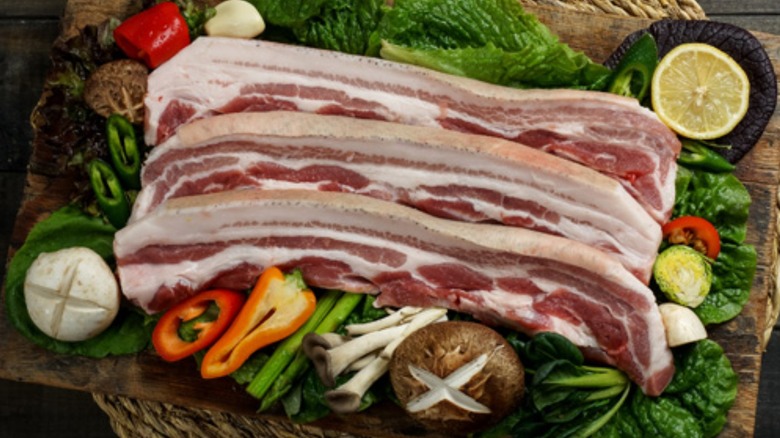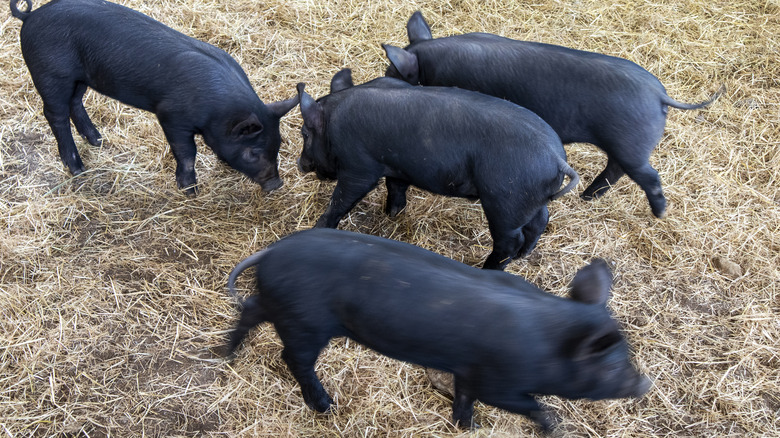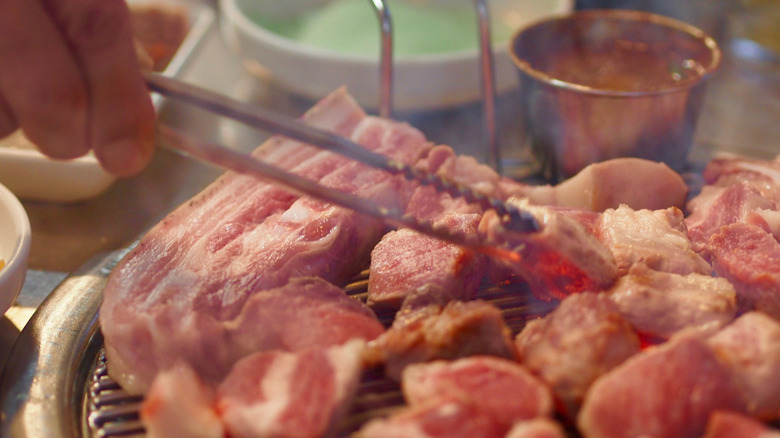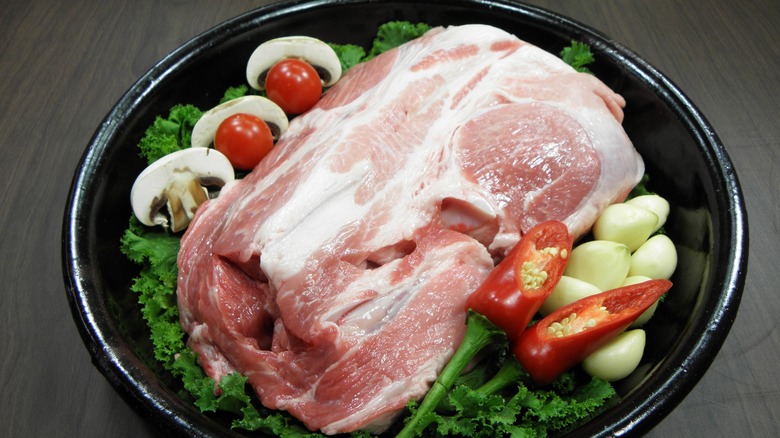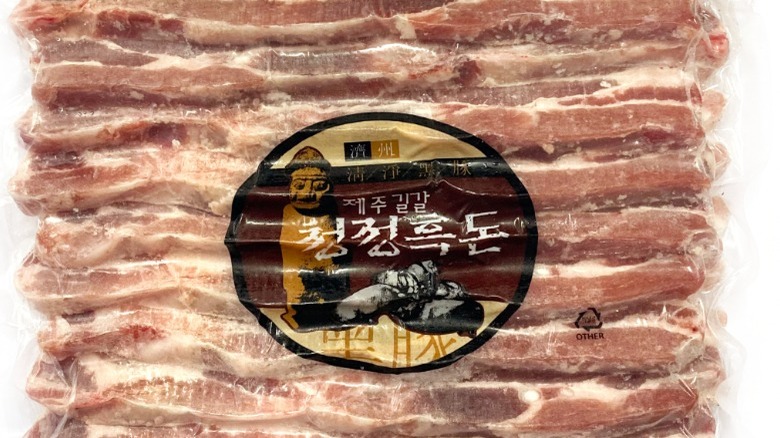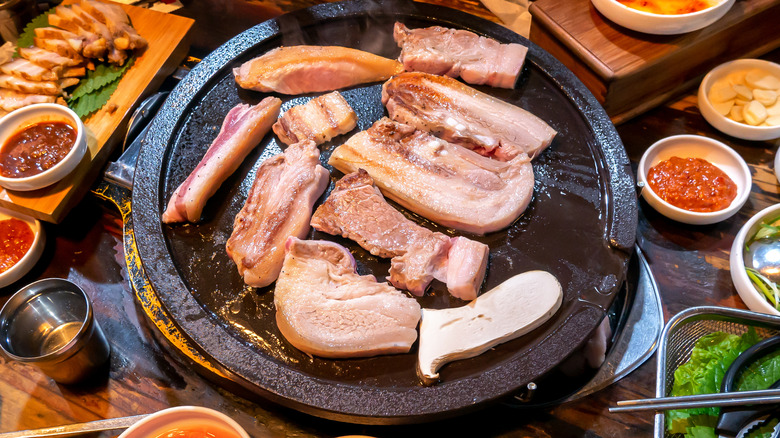Jeju Black Pig Is One Of South Korea's Most Coveted Meats
France has given the world Label Rouge chickens, which means that they were raised traditionally and free-range. Japan, on the other hand, is world-famous for its distinctive wagyu and kobe beef, with highly specific pedigrees and tastes. And while Korea is known for dishes like ddukbokki, kimchi, bulgogi, and japchae, the country also has its own special brand of pig meat that is considered to be the best pork in the game: Jeju black pig.
Named for the island which they hail from, the Jeju black pig is a special breed of pig that is equally rich in cultural history and taste. Unsurprisingly, it is a highly coveted meat variety that also draws tourists to the volcanic Jeju Island, which lies off the coast of the Korean Peninsula and also boasts the tallest mountain in South Korea. Here's everything you need to know about Korea's famous Jeju black pig.
The history of Jeju black pig
Traditionally, every household on the Jeju Island had a dedicated place — called a dottongsi — to raise their own Jeju pig. The pig's place in society was multifunctional: it disposed of food waste and human excrement, and in turn, produced rich fertilizer for farming use. Alive, the pigs — which have a characteristic glossy, black fur, short legs, and small ears — protected humans from island snakes, and dead, their meat provided a hearty stock of protein.
One missionary by the name of Father Patrick James McGlinchey decided to turn the natural affinity for the Jeju pigs into a pork industry. In the 1960s, the priest bought 2,000 piglets from Seoul and founded the Isidore Foundation, which trained farmers to breed high-quality pigs and started to build an infrastructure to widely distribute Jeju black pig pork.
Crossbreeding, however, diluted the meat quality of the original Jeju black pigs, and eventually, the Jeju Livestock Promotion Institute was created to preserve the remaining indigenous black pigs, which were designated as a natural heritage in 2015. Despite the fact that most Jeju pork today is a mix, the meat is still distinctive and sought-after.
What it tastes like
Since Jeju black pigs were originally raised in outhouses and ate human waste, they were given the not-so-appealing moniker "poop pig" (or "ddong dwaeji" in Korean). But the taste of the pig is hardly anything to poo-poo; Jeju pork is soft and not so greasy. A traditional way of consuming Jeju black pig during rituals was boiling it with soybean paste and garlic and then cutting the meat on a dombe — or cutting board — also known as the dish dombe gogi.
This method of consuming Jeju pork is the most simple — it lets the meat shine as the star of the show atop a dedicated long cutting board. Jeju pork is redder in color than normal pork and nearly resembles beef. Though it has a taste similar to steak, it has a distinctive chewy texture combined with a rich fatty taste.
Eaten freshly boiled, the meat has a baejigeun taste — a delicate balance between oiliness and flavor.
Health benefits
Healthwise, Jeju pork is fairly similar to standard pork. A 100-gram serving of the distinctive red pork meat contains about 280 calories, 24 grams of gat, 13 grams of protein, and 3 grams of carbohydrates. Compared with other pork meat, Jeju pork is a slightly better option for those interested in lowering cholesterol levels since the rich and dense meat has more polyunsaturated fatty acids (per Invest Korea). Jeju black pork also contains protein, collagen, vitamin A, B1, and beneficial fatty acids.
The skin of jeju pork also has nutritional benefits. Known as "dwaeji ggupdaeg" in Korea, pig skin is thought to be good for the skin due to the high amount of collagen, which helps keep our own skin from sagging and looking sallow, according to Cedars Sinai. Some Koreans even claim that pork is good for helping your respiratory system clear of pollution, though the science isn't clear on how (per The Jeju Weekly).
Where to buy and eat Jeju black pig
Jeju pork can also be served in a variety of manners outside the traditional dombe gogi way. One of the most popular ways is to eat the pork belly, or samgyupsal, during Korean barbecue. The thick pieces of meat are cut with scissors, grilled, and then dipped into myeolchi-jeot, an anchovy-based sauce that's uniquely paired with the prized meat.
One of the main places to get Jeju black pig meat is, of course, to head to Jeju Island, where there is a dedicated Black Pork Street, a tourist attraction that has restaurant after restaurant that serves up the pork specialty. However, to avoid a tourist trap, you may want to head to other places off the street, like the well-known franchise Childonga or Sukseongdo, where they are known for curing their meat.
If you want to try your own hand at cooking Jeju pork, several websites like New World Mart offer the prized pig meat for sale online, but such luxury doesn't come cheap — approximately 2.2 pounds of the meat costs $588.
How to cook jeju pork
Like any other pork meat, Jeju black pig pork can be cooked in a multitude of ways, and different cuts should be treated differently. However, if you want to prepare Jeju black pig pork the traditional way, you'll need to cut it into thick slices. It doesn't hurt to verify first that the pork you've bought is the real deal, and to do so, check the skin to see if it has black hair roots.
Once you're sure you're working with Jeju pork, grill the meat over charcoal, or better yet, burning hay, which produces a distinctive smoky flavor. Then, like any other Korean barbecue, you can add some garlic to the grill, creating a border of flavor around your meat that'll tinge the smoke flavor with another layer. Turn the Jeju pork on the grill until the meat is perfectly done with crispy skin and is sizzling in its own fat. Jeju pork is best consumed with no frills or additional sauces so that its unique flavor shines alone, but you can also dress it up with vegetables, ssamjang sauce, or even some sesame oil.
